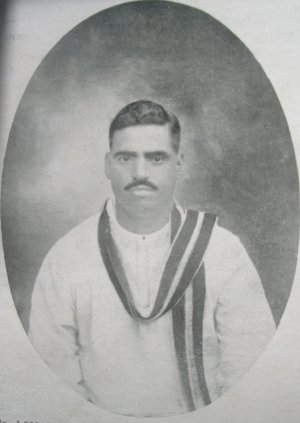K. L. Narasimharao
Dr. K. L. Narasimharao was born in 1900. After completing his secondary education he joined the Vizagapatam Medical School in 1918.
When the Non-cooperation movement was launched, he suspended his studies and joined the army of satyagrahis. He opened a volunteer camp, and conducting picketing and hawked khaddar. He conducted dramas depicting the Punjab atrocities. He was sentenced to four months of imprisonment for disobeying an order under Section 144 Cr. P.C.
On the movement being suspended, he went to Calcutta for completing his medical course and later came to Madras from where he took his degree and set up independent practice at Rajahmundry.
During the Salt Satyagraha movement he was sentenced to two years imprisonment and Rs 1000 fine, in default, six months additional imprisonment. While serving his term in Cannanore Jail he refused to give thumb impressions as he felt in humiliating, and was tried inside the jail and sentenced for a further six weeks.
He was released when the Gandhi-Irwin Pact was signed. During the truce period he concentrated on picketing foreign cloth in which he remarkably succeeded.
When the movement was revived on Gandhiji's arrest, and the Ordinance rule began, Dr Narsimharao found himself inside jail, this time for leading a batch of volunteers to observe Peshawar Day.
K.L. Kamat/Kamat's Potpourri
K.L. Narasimharao
He attended the Bombay Session of the Congress as a member of the A.I.C.C. During 1934-35 he was elected Secretary, East Godavari District Congress Committee and member of the Andhra Provincial Working Committee.
His continued jail life and frequent hunger strikes while in prison, told heavily on his health and he contracted tubercular pleurisy and was forced to stay in a sanatorium for a year.
In 1936-37 he was again elected a member of the A.I.C.C and attended the Faizapur Congress. This year also he has been elected a delegate to the Haripura Congress.
His heart throbs for the poor and the distressed. His hobby is giving free medical aid and organizing poor relief and collecting funds for helping the devoid and the destitute, irrespective of caste and creed.
![]()

